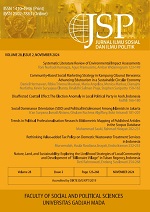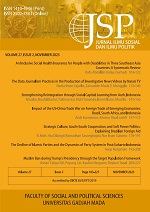Political Polarization and Selective Exposure of Social Media Users in Indonesia
Denny Januar Ali(1), Eriyanto Eriyanto(2*)
(1) Indonesian Survey Circle, Indonesia
(2) Department of Communication Science, Faculty of Social and Political Sciences, Universitas Indonesia, Indonesia
(*) Corresponding Author
Abstract
This study is intended to answer the question of how political polarization is related to social media users’ posts about Covid-19. The researchers chose health cases related to Covid-19 instead of political issues (e.g. elections) to prove that this political polarization has spread to many areas. The research also wants to see the relationship between this political polarization and selective exposure. Theories applied in this study are polarization, filter bubble, and selective exposure. The study applied two methods: social media network analysis and content analysis. The network analysis included 82,156 posts, while the content analysis was carried out on 4,050 social media accounts. The research outcome proves the occurrence of political polarization. Social media users were divided into two major groups, namely pro-Jokowi and anti-Jokowi. Each group interacted with fellow users who had the same political choices and shared the same message content. Users with certain political choices tend to receive the same information as their political choices, and ignore information from other political parties. Another interesting finding from this study is how this polarization was sharpened by the use of hashtags. Each party (supporters and oppositions of Jokowi) uses hashtags to create solidarity and mobilization from each supporter. Research also proves the validity of the selective exposure and filter bubble hypothesis in the Indonesian context.
Keywords
Full Text:
PDFReferences
Agarwal, N., & Liu, H. (2009). Modeling and data mining in blogosphere. In R. Grossman (ed), Synthesis lectures on data mining and knowledge discovery (pp.1-109). California: Morgan & Claypool Publis hers . https://doi.org/10.2200/S00213ED1V01Y200907DMK001.
Bakshy, E. , Messing, S., & Adamic, L.A. (2015). Exposure to ideologically diverse news and opinion on facebook. Science Magazine, 348(6239), 1130–1132. https://doi.org/10.1126/science.aaa1160.
Barisione, M., Michailidou, A., & Airoldi, M. (2017). Understanding a digital movement of opinion: The case of #RefugeesWelcome. Information, Communication & Society, 22 (8), 1145-1164. https://doi.org/10.1080/1369118X.2017.1410204
Barisione, M., & Ceron, A. (2017). A digital movement of opinion?: Contesting austerity through social media. In Barisione, M.& Michailidou, M. (Eds.), Social media and European politics: Rethinking power and legitimacy in the digital era (pp. 89–118). Basingstoke: Palgrave Macmillan.
Bennett, W. L. & Iyengar, S. (2008). A new era of minimal effects? The changing foundations of political communication. Journal of Communication, 58(4) 707–731. https ://do i.org/10.1111/j.1460- 2466.2008.00410.x.
Bishop, B. (2008) The big sort: Why the clustering of like-minded merica is tearing us apart. New York: Mariner Books.
Borgatti, S.P., Everett, M. G., & Johnson, J.C. (2013). Analyzing social network. Thousand Oaks, CA: Sage Publications.
Borgesius, F.J.Z, Trilling, D., & Moller, J. (2016). Should we worry about filter bubbles? Internet Policy Review, 5(1), 1–16. https:// doi.org/10.14763/2016.1.401.
Bozdag, E., & van den Hoven, J. (2015). Breaking the filter bubble: Democracy and design. Ethics and Information Technology, 17, 249–265. https://doi.org/10.1007/s10676-015-9380-y.
Bruns, A., & Burgess, J. (2012). Researching news discussion on twitter: New methodologies. Journalism Studies, 13(5–6), 801–814. https://doi.org/10.1080/1461670X.2012.664428.
Del Vicario, M., Zollo, F., & Caldarelli, G. (2017). Mapping social dynamics on facebook: The brexit debate. Social Networks, 50, 6–16. https://doi. org/10.1016/j.socnet.2017.02.002.
Dylko, I., Dolgov, I., & Hoffman, W. (2017). The dark side of technology: An experimental investigation of the influence of customizability technology on online political selective exposure. Computer in Human Behavior, 73, 181–190. https://doi. org/10.1016/j.chb.2017.03.031.
Frey, D. (1986). Recent research on selective exposure to information. In Liao, Q.V., Fu, W., & Mackay, W.E. (Eds.) Beyond the filter bubble: Interactive effects of perceived threat and topic involvement on selective exposure to information (pp. 2359–2368). Changing Perspectives Conference, Paris, France, 27 April–02 May 2013,. New York, NY, USA: ACM.
Gil de Zuniga, H., & Diehl, T. (2017). Citizenship, social media, and big data: Current and future research in social sciences. Social Science Computer Review, 35(1), 3–9. https:// doi.org/10.1177/0894439315619589.
Gil de Zuniga, H., Weeks, B., & Arde`vol-Abreu, A. (2017). Effects of the news-finds-me perception in communication: social media use implications for news seeking and learning about politics. Journal of Computer-Mediated Communication, 22 (3), 105-123. https://doi.org/10.1111/ jcc4.12185.
Golbeck, J. (2013). Analyzing the social web. Waltham, MA: Morgan Kauffman.
Hexmoor, H. (2015). Computational network science: An Algorithmic approach. Waltham, MA: Morgan Kaufmann.
Iyengar, S., & Hahn, K.S. (2009). Red media, blue media: Evidence of ideological selectivity in media use. Journal of Communication, 59(1), 19–39. https://doi. org/10.1111/j.1460-2466.2008.01402.x.
Iyengar, S., Sood, G., & Lelkes, Y. (2012). Affect, not ideology: A social identity perspective on polarization. Public Opinion Quarterly, 76(3), 405–431. https://doi.org/10.1093/poq/nfs038.
Jacobson, S., Myung, E., & Johnson, S.L. (2016). Open media or echo chamber: The use of links in audience discussions on the facebook pages of partisan news organizations. Information, Communication and Society, 19(7), 875–891. https://doi.org/10.1080/1369118X.2015.1064461
Kull, S., Ramsay, C., & Lewis, E. (2004). Misperceptions, the media, and the iraq war. Political Science Quarterly, 118(4), 569–598. https://doi.org/10.1002/j.1538-165X.2003.tb00406.x.
Lim, M. (2017). Freedom to hate: Social media, algorithmic enclaves, and the rise of tribal nationalism in Indonesia. Critical Asian Studies, 49 (3), 411-427. https://doi.org/10.1080/14672715.2017.1341188.
Maffesoli, M. (2016). From society to tribal communities (trans lated from the French by Rob Atkins). The Sociological Review, 64(4), 739-747. https://doi.org/10.1111/1467-954X.12434/
Marozzo, F. & Bessi, A. (2017). Analyzing polarization of social media users and news sites during political campaigns. Social Network Analysis and Mining, 8 (1). https://doi.org/10.1007/s13278-017-0479-5.
Negroponte, N. (1996). Being digital. London: Hodder & Stoughton
Pariser, E. (2011). The Filter bubble: What the internet is hiding from you. New York: Penguin Group.
Rader, E., & Gray, R. (2015) Understanding user believes about algorithmic curation in the facebook news feed. In Begole, B. & Kim J, (Eds,) Proceedings of the 33 rd Annual ACM Conference on Human Factors in Computing Systems (pp. 173–182). Seoul, Republic of Korea, 18–23 April 2015,. New York, NY, USA: ACM.
Rosyadi, M. S., & Eriyanto. (2019). The influence of the social media recommendation system against polarization in the views of user politics: Experiments on social media newsfeed on social media users. Proceedings of the 1st Sampoerna Univ ersity-AFBE International Conference, SU-AFBE 2018, 6-7 December 2018, Jakarta Indonesia. https://doi. org/10.4108/eai.6-12-2018.2286272
Stroud, N.J. (2008). Media use and political predispositions: Revisiting the concept of selective exposure. Political Behaviour, 30, 341–366. https://doi.org/10.1007/s11109-007-9050-9.
Stroud, N.J. (2010) Polarization and partisan selective exposure. Journal of Communication, 60(3), 556–576. https:// doi.org/10.1111/j.1460-2466.2010.01497.x.
West, R., & Turner, L. (2018). Introducing communication theory: Analysis and application. 4th Edition. New York,: McGraw-Hill.
Yang, G. (2016). Narrative agency in hashtag activism: The case of #BlackLivesMatter. Media and Communication, 4 (4), pp. 13-17. https://doi.org/10.17645/mac.v4i4.692.
Article Metrics
Refbacks
- There are currently no refbacks.
Copyright (c) 2021 Jurnal Ilmu Sosial dan Ilmu Politik

This work is licensed under a Creative Commons Attribution-NonCommercial-NoDerivatives 4.0 International License.























